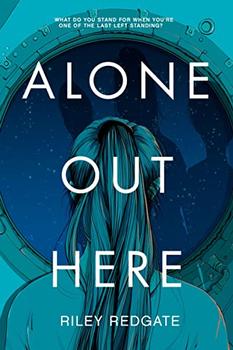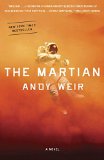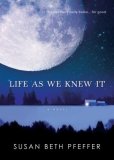Summary | Excerpt | Reviews | Beyond the book | Read-Alikes | Genres & Themes | Author Bio

Alone Out Here by Riley Redgate is a standalone young adult science fiction drama about isolation and survival in the cosmos. The plot centers around 53 teenagers living in deep space together aboard the Lazarus, a massive spaceship built to hold 90,000. Despite the alluring touch-panel panoply of its futuristic interior tech, the atmosphere is viscerally dominated by the sweat and grime of an inexperienced crew of stricken juveniles who are unprepared for the struggle to survive.
It is the year 2072. Since the founding of the Global Fleet Planning Commission (GFPC), Earth's nations have had three years to prepare for the impending eruption of Mount Shasta, a long-inactive supervolcano in Northern California. They know that once it begins, the discharge will darken the skies with ash and release enough methane gas to trigger a runaway greenhouse effect. Continents will be inundated, the air poisoned, and within months all aboveground life will die. Unable to halt the coming extinction, the GFPC has focused on mass-production plans for the Lazarus spaceship prototype, which promises to sustain future generations of humanity indefinitely. Scientists believed there would be ample time to build an entire fleet, but only one ship has been completed when the ground underneath the launch site begins to tremble a year earlier than forecasted, about 100 miles away from Mount Shasta.
The events of Alone Out Here are captured through the eyes of 18-year-old Leigh Chen, daughter of the United States president. She is part of a visiting tour group of middle and high school-aged teenagers from around the world, all of whom are the children of GFPC members, including the global political elite. The teenagers are among those selected through an international lottery to fill the passenger openings aboard the Lazarus. While her mother is away at a GFPC conference in Europe, Leigh has joined the group to take an orientation tour of the ship, situated half a mile away from their residential barracks. When Leigh awakens at the start of Part I to the roar of tectonic splintering and the shriek of civil defense sirens, she and the other teens have minutes to traverse the distance on foot before the emergency liftoff is initiated. None of the adult crew is in sight when they reach the airlock. The auto-launch is successful, but all communications with Earth are severed shortly after reaching orbit. The Lazarus is suddenly alone in the universe.
The Lazarus teenagers represent a consortium of cultures, a spaceborne tower of Babel speaking languages from Arabic to Swahili. Communication is hopeless without advanced AI translator earpieces. Eli Jefferson, the only one with piloting experience, reluctantly assumes command. She is quick to appoint a handful of Council members to assist her with leadership duties. Leigh's new position is an extension of her former role as First Daughter, a public relations liaison between Eli's Council and everyone else. In the coming days, she must grapple with the needs of a homesick crew afflicted with survivor's guilt, and pacify rattled minds as bickering and accusations break out over whose country is at fault for the GFPC's botched planetary evacuation plans. Despite her best efforts, many remain vocal in their opposition to Eli and the Council's unilateral rule. Various group disagreements escalate over the months into a string of random violent assaults. The formerly timid Eli becomes unrelenting in her push for mass surveillance, punishment without trial and strict meal rationing to address a burgeoning food crisis. With little time left to reverse the downward course of events, Leigh must decide for herself whether Eli truly represents the best interests of the Lazarus and all of humanity.
Alone Out Here is a thought-provoking read addressing a range of sensitive themes. These include emotional trauma, bullying and online harassment. Descriptions of death and violence are more emotionally charged than physically graphic. One character arc deals briefly with psychological shock and suicidal ideation. Another addresses discrimination based on sexual orientation. Democratic idealism and the pendulum sway of group consensus are thoughtfully juxtaposed against the cold efficiency of technocratic policies that overstep personal freedoms. Elements of censorship, eugenics and propaganda methods evocative of George Orwell's 1984 are also present.
Leigh's subjective first-person narrative combines the disquieting deep-space isolation of Captain Janeway's small crew on the television series Star Trek: Voyager with the post-apocalyptic, existential dread of Commander Adama and the others on the show Battlestar Galactica. The absence of adults becomes especially pronounced as the Lazarus group is plagued by a dearth of STEM proficiency and experienced leadership. Everyone is shellshocked to varying degrees from the loss of Earth, families and friends, but no one is qualified to counsel their grief. Lost-in-translation moments are mostly averted via the AI translators, and the plot only momentarily explores the myriad of mutual animosities bound to spring forth from bitter memories over the last three years of global American exceptionalism, GFPC political scandals, military conflicts, race riots, ethnic persecutions, etc. resulting in the deaths of tens of thousands back on Earth.
Redgate uses rich descriptions of her characters' endearingly idiosyncratic mannerisms and personal nostalgic memories of Earth to capture the reader's undivided attention, especially through Leigh. By making the reader privy to Leigh's insecurities and self-denigrating guilt buried beneath her impassive politician's exterior, she ensures the complex social issues and geopolitics of the Lazarus teens never overshadow the bottom line that they are all still children, barely on the cusp of adulthood, and in well over their heads. Ultimately, Leigh's personal struggle is with herself. She wants to serve Eli and the "greater good" but realizes that she is erasing her own convictions in the process. Her journey is learning that she cannot stand for others until she stands for herself.
![]() This review
first ran in the May 18, 2022
issue of BookBrowse Recommends.
This review
first ran in the May 18, 2022
issue of BookBrowse Recommends.

If you liked Alone Out Here, try these:

by Andy Weir
Published 2014
Six days ago, astronaut Mark Watney became one of the first people to walk on Mars. Now, he's sure he'll be the first person to die there.

by Susan Beth Pfeffer
Published 2008
A meteor knocks the moon closer to the earth. How should Miranda's family prepare for the future?
Your guide toexceptional books
BookBrowse seeks out and recommends the best in contemporary fiction and nonfiction—books that not only engage and entertain but also deepen our understanding of ourselves and the world around us.